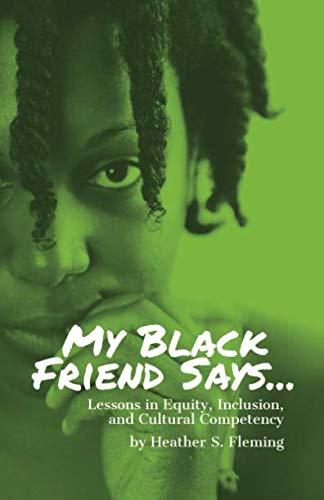My Black Friend Says… #BookReview #WeNeedDiverseBooks
Book: My Black Friend Says… Lessons in Equity, Inclusion, and Cultural Competency by Heather S. Fleming
Genre: Nonfiction
Publisher: Independently published
Publication date: 2019
Pages: 153
Source: Trade paperback borrowed from the library
 Summary: Heather Fleming is a teacher and those skills show up on every page of this book. Hard concepts are explained in easy-to-understand segments with opportunities for reflection and putting what we’ve learned into practice. This book explains why colorblindness isn’t our goal, how to distinguish between diversity and inclusion, and even the dreaded question of what to do about Uncle Bob at Thanksgiving.
Summary: Heather Fleming is a teacher and those skills show up on every page of this book. Hard concepts are explained in easy-to-understand segments with opportunities for reflection and putting what we’ve learned into practice. This book explains why colorblindness isn’t our goal, how to distinguish between diversity and inclusion, and even the dreaded question of what to do about Uncle Bob at Thanksgiving.
Thoughts: This is my new favorite book to recommend for people starting their anti-racist journey and for all of us for the inevitable refresher course that we need along the way.
Of the many books that I’ve read that could make good introductory books, My Black Friend Says… is the one that most closely matches the journey that I took.
First, dump the shame as quickly as possible. It’s the opposite of helpful on the path to anti-racism.
The most important aspect of shame is that it ends or prevents necessary conversations that we must have around race, ethnicity, gender, religion, etc. p. 13
Guilt has a place in recognizing when we mess up, but shame does not.
Second, learn from this book about a bunch of the mistakes that many of us make. Learning them from a book means that we don’t have to experience the guilt and its aftermath because we didn’t inflict them on an actual person.
Third, learn how to make a good apology when we inevitably make mistakes.
With those three basic functions in place, we’re now ready to take appropriate responsibility. This quote comes as part of an explanation and analogy about the contaminated water in Flint, Michigan.
This is exactly how systemic racism works. A system was created years ago that has not been solved, but needs to be fixed for the sake of those impacted. No one who is affected by the system can change it without the support of those who have control over the system. No one who currently has control over the system was responsible for setting it up, but could make change if they wanted to by implementing a new system or overhauling the current one, including replacing the parts that are corroded and cause the most damage. People not impacted tend to ignore the fact that the problem has not been corrected, or assume that someone else is working on it, and therefore, place little time, energy, or passion into pressuring those with the power to make change to do so immediately.
For this reason, it becomes everyone’s responsibility to make change, with the onus placed on the white community to do the heavy lifting. Racism is a problem that white people own, but from which black people suffer. The change that must take place will inevitably fall to the group that owns it. p. 51
From there, Fleming details ways that we can take responsibility in the workplace, in our families, and beyond.
Appeal: Read My Black Friend Says...to be a fellow traveler on the journey to correct systemic racism. Here is a secret that isn’t obvious until the journey is begun — the experiences are rewarding and filled with love and laughter.
Or, as Heather Fleming puts it more beautifully about the experiences on this journey:
Some of those experiences will feel like a night at the Ritz Carlton; others will feel like a pallet on a forest floor. Experience. Learn. Reflect. Think. Fall in love with the journey and the people with whom you share it. p. 9
Challenges: My Black Friend Says… is my second of five books for the 2023 Diversity Reading Challenge. This book is all about relationships, so I’m going to count it for that category, making it the third of six books in the 2023 Nonfiction Reading Challenge.
Have you read this book? What did you think?


Thank you for sharing your thoughts about this book. It’s a book I have been very curious about.